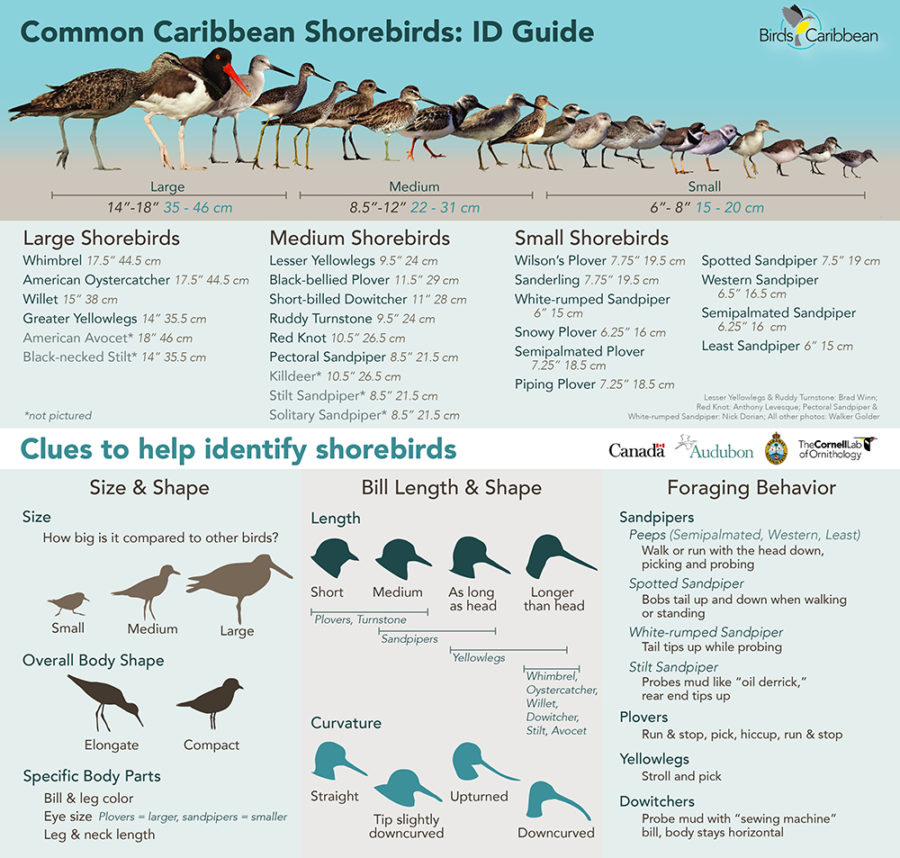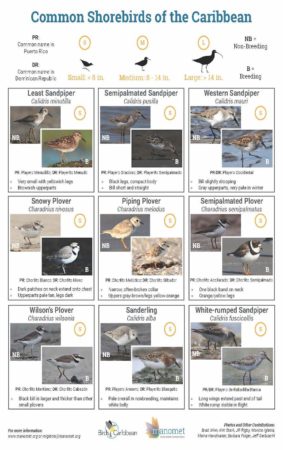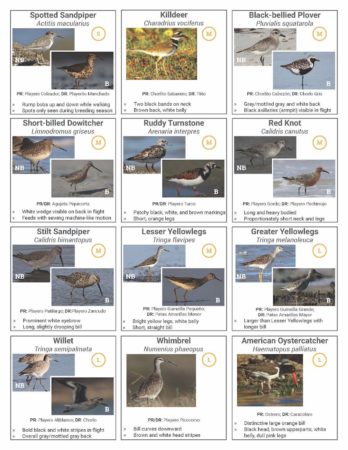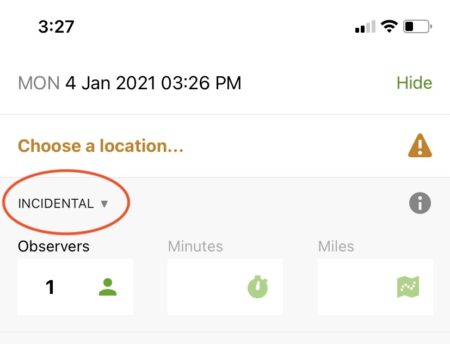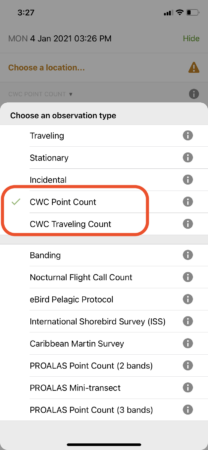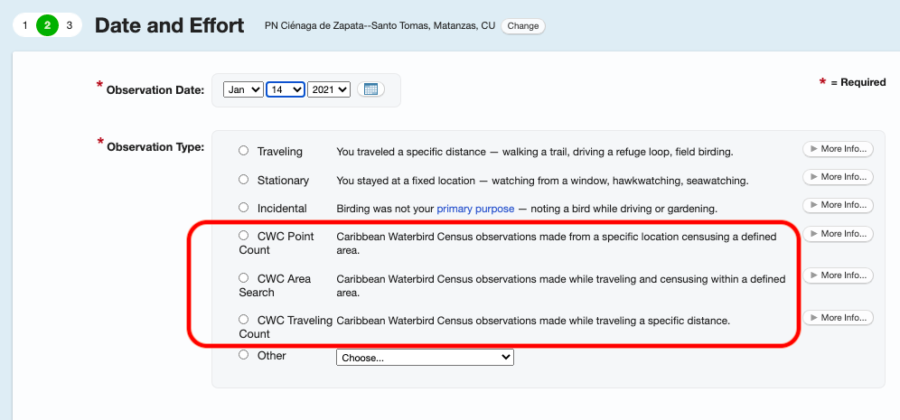The 2021 Caribbean Waterbird Census: Join us from Jan 14th – Feb 3rd

The 12th annual Caribbean Waterbird Census (CWC) starts on Thursday January 14th and we need your help surveying all types of waterbirds on your island! Anyone can participate in the CWC. Grab your binoculars and your mask, head out to your nearest wetland or beach, and record the birds you see. Detailed information about how to conduct surveys can be found here.
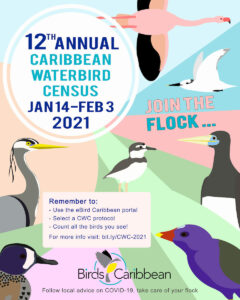 Starting in 2010, dedicated bird enthusiasts have ventured into wetlands across the Caribbean to systematically survey all types of waterbirds (shorebirds, seabirds, wading birds, marshbirds, and waterfowl) each January 14th to February 3rd. The Caribbean is home to over 185 species of waterbirds, including a number of endemic and globally threatened species and many migrants. A structured, ongoing survey is essential for understanding how to best conserve this exceptional group of birds and manage their habitats.
Starting in 2010, dedicated bird enthusiasts have ventured into wetlands across the Caribbean to systematically survey all types of waterbirds (shorebirds, seabirds, wading birds, marshbirds, and waterfowl) each January 14th to February 3rd. The Caribbean is home to over 185 species of waterbirds, including a number of endemic and globally threatened species and many migrants. A structured, ongoing survey is essential for understanding how to best conserve this exceptional group of birds and manage their habitats.
Good luck, stay safe, and we look forward to hearing about your findings. If you have any exciting observations to report or photos to share, or need help with bird ID, please post to our Waterbird Group Listserve (everyone is welcome to join) and/or on our BirdsCaribbean Facebook page. For sharing on social media, use hashtags: #CaribbeanWaterbirdCensus and #WaterbirdsCount AND please tag us: @BirdsCaribbean
Count Birds & Stay Healthy
In these extraordinary times, many of our friends and partners are still trying to navigate their new normal and safely participate in outdoor activities. However, in many countries, we understand it is still not possible to do so. Participants of the Caribbean Waterbird Census should check their national guidelines to make sure their activities are in compliance with local health recommendations. Please take all the necessary precautions and stay safe, wherever you are!
The CWC Provides Critical Information about Wetlands & the Birds that Rely on Them
Wetlands are unique ecosystems that provide critical habitat to many specialist species. They are also one of the most threatened habitats in the world. Since 1900, 64% of the world’s wetlands have disappeared, and the Caribbean region is no exception to this crisis. In order to properly manage habitat for waterbirds in the Caribbean, we need to understand waterbird population trends. In addition, monitoring the health of waterbird populations and their habitats is beneficial to both birds and people, since we rely on the same habitats for our health and well-being.
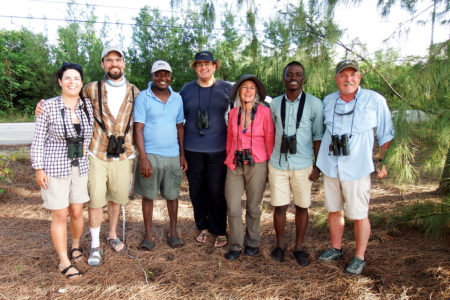
Recent survey work in Turks and Caicos has revealed important sites for many shorebird species, including birds of conservation concern such as the Piping Plover and rufa Red Knot. In fact, teams surveying there recently documented record-breaking numbers of wintering Piping Plover in some areas and recording new Piping Plover sites altogether. This information is so important for conservation as just a few decades ago it was not well-understood where these endangered birds spent the winter. Now, we know the Caribbean plays a major role for the species and we are learning more with every survey effort.
Survey data can also be used as a tool to designate habitats that are essential for birds. For example, The Cargill Salt Ponds in Bonaire were designated a Western Hemisphere Shorebird Reserve Network (WHSRN) site of Regional Importance as a direct result of survey efforts. With the survey data we collected, our team was able to provide evidence that the site met the criteria for listing. Now, Cargill is dedicated to managing habitat for shorebirds on their property. It’s amazing what birding can achieve!
The CWC is also important for monitoring how hurricanes effect bird abundance and distribution. In 2017, Hurricanes Irma and Maria wreaked havoc in the Caribbean, damaging fragile wetland ecosystems. Results from the CWC in 2018 several months later were concerning, with our counters reporting dramatic declines in common bird species. The CWC in 2019 revealed encouraging numbers, especially for shorebird populations. It is important to continue monitoring the response of birds to hurricanes in the years that follow and we look forward to what the 2021 CWC will reveal.
Banded Birds
Be sure to be on the lookout for banded birds! Especially Piping Plovers, Red Knots, Semipalmated Sandpipers, Ruddy Turnstones, and Sanderlings. You may report your sightings to BandedBirds.org and the USGS Bird Banding Lab which oversee all banding in the United States.
Need Help?
Find a tricky shorebird in winter plumage that you can’t identify? Need help setting up an eBird account? Want to participate in the CWC but you’re not sure how to get started? Please contact BirdsCaribbean’s Executive Director Lisa Sorenson at lisa.sorenson@birdscaribbean.org.
Shorebird ID Resources
You can find all our free, downloadable shorebird resources by clicking “Resources” –> “Shorebird Resources” at the top of the page. You can download the pdf of our Quick ID Guide to Common Shorebirds of the Caribbean here. For use in the field, print on cardstock and laminate.
Also, check out our Common Shorebirds of the Caribbean poster, which is available in English, Spanish, and French. Download them from this page.
We also have available a two-page Common Shorebirds of the Caribbean ID Guide – you can download it here. All these ID resources work well in the entire Atlantic Flyway, not just the Caribbean islands.
Entering CWC Data in eBird
CWC data is stored on eBird Caribbean. If you participate in the CWC, it’s very important that you enter your data through this website using the correct CWC protocol, because this is where we collate all the data used for analyses. We don’t want to miss a single bird or site! Simply making an eBird list during these dates is not enough- the protocol is required for it to be CWC data.
If you are using the mobile eBird app to enter your data:
- First, make sure the portal is set to eBird Caribbean (“Settings” –> “Portal”)
- After you are done birding and press stop “Stop Track”
- On the next page under the Date/Location and above Observers, click on “Incidental”
- Select the appropriate CWC protocol under Observation Type
If you are using a desktop computer to enter your data:
- Sign into your account on ebird.org/Caribbean
- Enter location information
- Select the appropriate CWC protocol under Observation Type
If you recorded your CWC data using the mobile eBird app and didn’t use the eBird Caribbean portal/input the correct CWC protocol :
After you have submitted your checklist on your smartphone:
- Log into eBird on a desktop computer
- Click on “My eBird” at the top of the screen
- Click on “Manage My Checklists” on the right menu
- For your CWC checklist, click on “View or Edit”
- Click on “Edit Date and Effort”
- For Observation Type, select “Other” and then choose the appropriate CWC protocol

